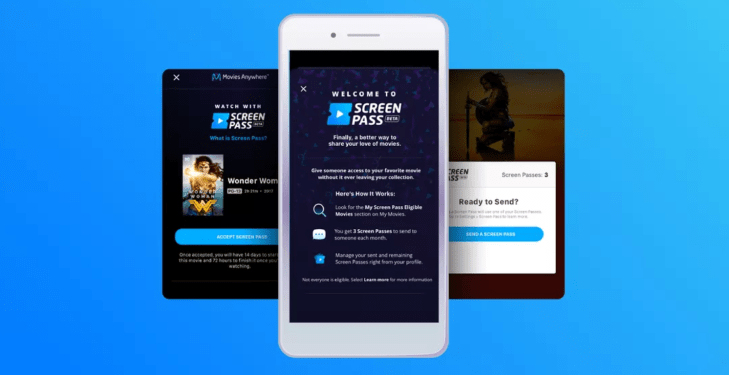Music
Trailers
DailyVideos
India
Pakistan
Afghanistan
Bangladesh
Srilanka
Nepal
Thailand
Iraq
Iran
Russia
Brazil
StockMarket
Business
CryptoCurrency
Technology
Startup
Trending Videos
Coupons
Football
Search
Download App in Playstore
Download App
Best Collections
Technology

Movies Anywhere, the digital locker service that lets you access your purchased movies from across services including iTunes, Vudu, Prime Video, YouTube, Xfinity, and others, is preparing to launch a new movie sharing option. According to a report from CNET, the service today will begin testing a new &Screen Pass& feature that allows users to share a movie with friends via a text message sent from the Movies Anywhere mobile app.
Users must accept the Screen Pass within 7 days to gain access to the shared title.
The new feature will work a lot like a movie rental, as recipients have a limited time to watch the movie — in this case up to 14 days. Viewers then have 72 hours to finish watching the shared movie.
Meanwhile, Movies Anywhere users will also be limited to sharing only three movies per month.
The movies can be watched across the Movies Anywhere platform, except on Roku devices for the time being.
The feature isn&t yet publicly available, but is instead launching into a limited beta test later today, CNET says. The plan was to have Screen Pass commercially available by late summer or early fall. In other words, it may not be around to help consumers stuck at home looking for something to watch during the early days of the COVID-19 crisis.
A spokesperson told the news outlet they&re working to move up the launch, in light of the &unprecedented& circumstances facing the U.S.
The Movies Anywhere app, originally called Disney Movies Anywhere, has been around in some form since 2014 but remains a bit under-the-radar as people now turn to streaming services to watch their favorite films Initially intended as a way for Disney fans to aggregate their Disney, Pixar, and Marvel film purchases in one place, long before Disney+ was even conceived, todayMovies Anywhere service is jointly operated by a number of industry partners. In addition to Disney, this includes Universal, WB, Sony Pictures, and 20th Century Fox.
Itnot clear at this time how many movies will be enabled for Screen Pass when it goes live, but it will be limited to select titles, the report noted.
- Details
- Category: Technology Today
Read more: Movies Anywhere to launch a movie-sharing feature called ‘Screen Pass’
Write comment (93 Comments)
Hello and welcome back to our regular morning look at private companies, public markets and the gray space in between.
As investors struggle to price the stock market as economic and political news continues to break, the private market is entering a rough period. It seems increasingly likely that the period of disruption due to COVID-19 will persist for months, if not quarters. That means missed Q1 and Q2 revenue growth, bookings, and the like from startups domestically and around the world.
And thatthe bullish case. For some cohorts of startups, the outlook is even worse. Think about travel startups, ride-hailing upstarts, and any grouping of private companies that pursued a high-burn, high-growth model; that final category is about to run into the twin issues of the inflexibility of cost structure and the impact of slowing sales. That alone would make fundraising more difficult; toss in a deflating stock market and possible recession, and the mixture is a downright mess.
But we owe it to ourselves to survey what is going on in an attempt to answer our own questions about IPOs, exits, unicorn tallies, and who might be in trouble. Unlike when things were less bad, there will be no laughing this morning and no jokes. Just notes on whatgoing wrong and what it might mean for private companies.
- Details
- Category: Technology Today
Read more: Have numerous unicorns missed their exit window as Q1 IPOs grind to a stop
Write comment (94 Comments)
Extra Crunch is excited to announce a new community perk from Startup Battlefield alum Osano. Starting today, annual and two-year members of Extra Crunch can receive 60% off their data privacy management software for six months. You must be new to Osano to claim this offer. This coupon is only applicable to Osanoself-service plans. Osano is an easy-to-use data privacy platform that instantly helps your website become compliant with laws such as GDPR and CCPA. Osano works to keep you out of trouble and monitors all of the vendors you share data with — so you don&t have to. Connect the data dots to see whathiding with Osano here.
You can sign up for Extra Crunch and claim this deal here.
Extra Crunch is a membership program from TechCrunch that features weekly investor surveys, how-tos and interviews with experts on company building, analysis of IPOs and late-stage companies, an experience on TechCrunch.com thatfree of banner ads, discounts on TechCrunch events and several Partner Perks like the one mentioned in this article. We&re democratizing information for startups, and we&d love to have you join our community.
Sign up for Extra Crunch here.
New annual and two-year Extra Crunch members will receive details on how to claim the perk in the welcome email. The welcome email is sent after signing up for Extra Crunch.
If you are already an annual or two-year Extra Crunch member, you will receive an email with the offer at some point over the next 24 hours. If you are currently a monthly Extra Crunch subscriber and want to upgrade to annual in order to claim this deal, head over to the &account& section on TechCrunch.com and click the &upgrade& button.
This is one of more than a dozen Partner Perks we&ve launched for annual Extra Crunch members. Other community perks include a 20% discount on TechCrunch events, 90% off an annual DocSend plan and an opportunity to claim $1,000 in AWS credits. For a full list of perks from partners, head here.
If there are other community perks you want to see us add, please let us know by emailing This email address is being protected from spambots. You need JavaScript enabled to view it..
Sign up for an annual Extra Crunch membership today to claim this community perk. You can purchase an annual Extra Crunch membership here.
Disclosure:This offer is provided as a partnership between TechCrunch and Osano, but it is not an endorsement from the TechCrunch editorial team. TechCrunchbusiness operations remain separate to ensure editorial integrity.
- Details
- Category: Technology Today
Read more: Extra Crunch members get 60% off data personal privacy platform Osano
Write comment (99 Comments)
Smart rings are still a relatively young category in the wearable hardware world, but the Oura Ring seems to be a standout in terms of early success. The Oura Ring hardware is sleek and packed with sensors, allowing it to measure a usersleep patterns, take your body temperature and track activity, and now Oura has raised $28 million in Series B funding to bring on new key hires and product updates.
In a Medium post announcing the raise, Oura CEO Harpreet Singh Rai revealed that to date, the company has sold over 150,000 of its rings since launch (which was in early 2018) and that its team has grown to over 100 people globally. The Series B funding comes from Forerunner Ventures, which has a strong track record when it comes to direct-to-consumer product company investments, as well as from Gradient Ventures and Square.
Along with the investment, Oura gains two new board members, and one new board observer all with expertise in different aspects of the startupbusiness: ForerunnerEurie Kim and Squarehardware lead Jesse Dorogusker are the new board members, and Gradient partner (and former VP of engineering at Google) Anna Patterson joins as the observer.
Oura will be revamping its website and adding a new web-based portal for Oura Ring users that offers &actionable insights,& the company says, and itgoing to be doing more in terms of collaborating with academic researchers on ensuring its products measurements and guidance remain as accurate and useful as possible.
Oura prioritizes the role of sleep in terms of its contribution to health, and has also recently ventured into the realm of meditation, but it acts as a general fitness tracking device as well. It has attracted a number of fans among the plugged-in tech elite, too, including Twitter and Square CEO Jack Dorsey. The company deserves kudos for delivering a solid, attractive and feature-rich gadget in a category that seemed like a tough sell in the early offing, and this new funding is a good vote of confidence.
- Details
- Category: Technology Today
Read more: Oura raises $28 million for its health and sleep tracking ring
Write comment (98 Comments)
Japanese telecom conglomerate SoftBank Group has faced a litany of bad news in recent weeks, including reported revelations from the Wall Street Journal that the head of its Vision Fund was using corporate espionage firms to sabotage his corporate peers and that activist hedge fund investor Elliott Management had invested in the company to try to force more transparency to its balance sheet and board of directors in a bid to drive its stock price higher.
The bad news just keeps coming though.
Today, S-P Global Ratings downgraded the groupdebt outlook to &Negative& from &Stable& while affirming the debtrating of BB+, which is generally considered somewhat speculative or non-investment grade.
In the note from the ratings agency, S-P said that it was particularly concerned about SoftBankshare repurchase program, which would see cash liquidity decrease as it buys up shares from investors on the public markets. That program, which would encompass about $4.8 billion in share buybacks and was announced last week, &[raises] questions over its intention to adhere to financial management that prioritizes its financial soundness and the credit ratings on it.&
My colleague Arman and I have covered SoftBankdebt obsession obsessively on TechCrunch, but we last conducted that analysis at the tail end of 2018 when markets were still soaring and SARS-CoV-2 had yet to be discovered.
Now though, SoftBankpenchant for debt is running straight into one of the most harrowing moments in recent economic history.
SoftBankdebt-fueled expansion is particularly notable in its Sprint and T-Mobile telecom merger, which was recently approved by U.S. antitrust authorities and included tens of billions of dollars of debt to consummate, as well as in the Vision Fund, where special provisions in the fundstructure guarantees a minimal level of return to investors. As the Financial Times reported back in 2017:
That debt provided by the Vision Fundinvestors will be in the form of preferred units, which will receive to an annual coupon of 7 per cent over the fund12-year life cycle.
Yet, with few IPOs likely on the horizon given the catastrophic fall in the markets the past few days, what will happen to liquidity in the Vision Fund, and how will it meet that 7% minimum target? Or how will the combined Sprint and T-Mobile win over customers in a quickly souring economy to pay off down its gargantuan debt load?
The upshot for SoftBank is that it offers a service most customers consider essential. Thatone of the reasons why its debt hasn&t seen a ratings downgrade: ultimately, consumers are still going to need their smartphones to work. But with the piles of debt adding up and the economy in tatters, its future is looking evermore hazy and dangerous.
- Details
- Category: Technology Today
Read more: SoftBank’s debt outlook turns negative
Write comment (100 Comments)
By now we know that Kubernetes is a wildly popular container management platform, but if you want to use it, you pretty much have to choose between having someone manage it for you or building it yourself. Spectro Cloud emerged from stealth today with a $7.5 million investment to give you a third choice that falls somewhere in the middle.
The funding was led by Sierra Ventures with participation from Boldstart Ventures.
Ed Sim, founder at Boldstart, says he liked the team and the tech. &Spectro Cloud is solving a massive pain that every large enterprise is struggling with: how to roll your own Kubernetes service on a managed platform without being beholden to any large vendor,& Sim told TechCrunch.
Spectro co-founder and CEO Tenry Fu says an enterprise should not have to compromise between control and ease of use. &We want to be the first company that brings an easy-to-use managed Kubernetes experience to the enterprise, but also gives them the flexibility to define their own Kubernetes infrastructure stacks at scale,& Fu explained.
Fu says that the stack, in this instance, consists of the base operating system to the Kubernetes version to the storage, networking and other layers like security, logging, monitoring, load balancing or anything thatinfrastructure related around Kubernetes.
&Within an organization in the enterprise you can serve the needs of your various groups, down to pretty granular level with respect to whatin your infrastructure stack, and then you don&t have to worry about lifecycle management,& he explained. Thatbecause Spectro Cloud handles that for you, while still giving you that control.
That gives enterprise developers greater deployment flexibility and the ability to move between cloud infrastructure providers more easily, something that is top of mind today as companies don&t want to be locked into a single vendor.
&Therean infrastructure control continuum that forces enterprises into trade-offs against these needs. At one extreme, the managed offerings offer a kind of nirvana around ease of use, but itat the expense of control over things like the cloud that you&re on or when you adopt new ecosystem options like updated versions of Kubernetes.&
Fu and his co-founders have a deep background in this, having previously been part of CliQr, a company that helped customers manage applications across hybrid cloud environments. They sold that company to Cisco in 2016 and began developing Spectro Cloud last spring.
Itearly days, but the company has been working with 16 beta customers.
- Details
- Category: Technology Today
Page 1224 of 1446

 7
7





